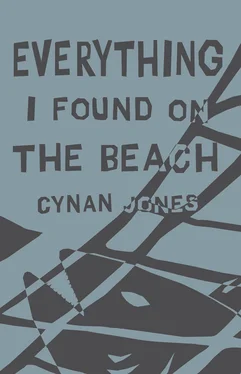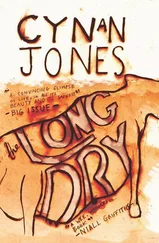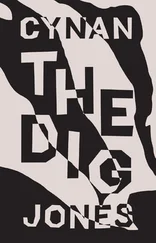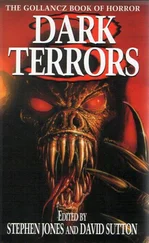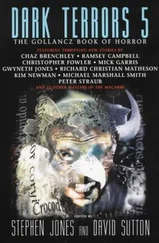“Eat breakfast, you scary fuck!” he said.

Hold got up and gathered up the bag of rabbits and left the key on the bed and went out. He had not slept.
He went out onto the street. The thick mist sat in the street and he could see the minute drops shift in front of him with this great individuality. He was tired from not sleeping and spaced somehow and felt in some ways a great and dangerous carelessness now.
He went up out of the street to the van and got in and then turned on the engine and headed out of the town slowly in the fog.
“There’s a way out,” he said. “I don’t need the money. It’s not worth the risk. And I don’t want these any more, it’s like they’ve become some part of me.” It was as if the drugs had some voice to him now, as if they had taken on a little song.
He drove out of the town with this numb decisive sense and headed into the island and it was as if the fog thickened and the farther he got the less he could see.
“It’s closing around me,” he thought.

“And you’re sure it’s clear?” said Stringer. He thought of the big man getting to the boat.
“It’s better in the day,” said the owlish man. “Kids in school. People in work. And we should use this.” The owlish man gestured at the fog.
“What about the water?” The man from the city did not know about the tides so well.
“It shouldn’t be enough to move the body much. But you’ll have to make sure the stuff stays with him.”
That had been the Scouser’s call. Leave the link there. Make it clear the thing was drug related, send a little ripple out.
“We’ll make sure,” said Stringer. But there was this growing germ in him.

The big man waded through the knee-deep water. He could feel the slight tug of the water as the tide went out. The fog licked around him, and every half a minute or so came the far off sound of the foghorn from the Stack. It was like some slow pulse, some clock.
He swung the bag into the boat and climbed himself with the surprising agility he had up the thin aluminum ladder at the back and got out of the water and uncertainly in. As soon as his legs were out of the water he could feel the cold on them. He sat on the side of the boat looking much too big for it and the boat shifted strangely under him, half afloat in the shallow water. He took off his shoes and emptied out the water over the side of the boat. Then he peeled off his socks and wrung them out over the side into the ebbing water. He looked down at the bag as if checking it was safe.
The fog came round him and the boats in the line around seemed to peer oddly at the big man sitting there unsteadily on the boat. They appeared like half-colored shapes through an opaque window. He could feel the boat lull and bounce unexpectedly with the water and hunkered, as if his big weight could keep the boat still. Already the memory of the sick came to him like a taste.
“It’s always me,” thought the big man to himself. He could feel the cold getting into the bones of his feet. His toes looked strange to him, bleached and drained of blood in the water.
He looked at the way the boats in-line appeared oddly through the fog and remembered the guy in the sauna at the massage parlor, the way his face seemed to form out of the thin steam when he’d gone in to get him, the scorched meaty smell of his face on the coals, the force he’d had to use to get him off the coals afterwards like it was an egg stuck to a pan.
“There’s always something,” he thought. “Always some little thing to put up with.” The foghorn came again, repetitively. It could grate on you. He remembered the irritation of the sweat pouring into his eyes as he did the sauna job. “This time it’s just cold. And these damn boats,” he thought. “There’s always something.”
He looked back down at his feet. “They look like a dead man’s feet,” he thought. “They look like Mikey’s feet when they pulled him out of the Liffey.” He reached for his socks and put the wet socks on again to cover up his feet, thinking of his dead brother. Then he put his shoes on and got down in the belly of the boat.

Hold pulled the van up in the shallow gateway at the side of the road. He took the knife and slit open the rabbits, nicking the nylon stitches that had bitten into the hardening flaps of skin and were sunk down hidden in the fur. The icepacks had long since lost the ice and the inside of the bag had gone warm and the smell was starting to come off the rabbits. The condensation from the temperature changing in the bag had stuck their fur in clumps and they looked bedraggled and undignified now, like wet leaves.
It was very early and the first light was stretching out and amplified by the fog and it was white and directionless. Every thirty seconds or so, Hold could hear the low moan of the lighthouse foghorn, but it was faint, almost imperceptible.
Then there on the side of the road, Hold wet some toilet paper he had taken from the room and wiped off the blood that had dried chocolate red on the packages and put the three packages in a carrier bag.
He looked out over the field disappearing into the fog with the light coming up and thought back. He thought back to the similarly short rabbit-cropped grass of the slopes above the cliffs, of the gull-dropped shells and desiccated mermaid’s purses, the broken bits of crab that scattered about in the short grass, bleaching in the salt and light. He thought of the slow uncoiling of the rabbits when they were shot, this kind of easement of the tension something hunted must live under and he felt the bedraggled, dampened carcasses there in his hands.
“Maybe it can be the same,” he thought. “This money won’t change anything, it’s not enough. It is only I that know about this, and if I can close that away somewhere so no one else can see it, then there’s no reason why things can’t just be the same.”
He thought back over the long distance of the last day.
“No one is affected by this, nothing changes,” he thought. “I can just go back to how it was. I was right. I was right not to bring the gun.”
He sat in the van for a while, not focusing anywhere. He was back on the boat, running the knife through the fillets, feeling the minute bump of the knife break through the glaceous rib bones with this train-track rhythm.
He noted the foghorn again and somewhere an oystercatcher called, startled. He could feel himself gathering, coming together. Just one thing to think of, then he could return to it all. There would be other ways to sort the problems, or other things that grew from whatever happened in the wake of them. But there would always be the beach, the long nets, the company of the tides. “You can’t rescue everyone,” he thought. “People survive their own way.” He felt the gathering, the coming together. “I was right not to bring the gun.” He looked down at the rabbits prone there in his hands.
“One last thing,” he said. “One more thing. This is the last part.”
Then he threw the empty rabbits into the field.

After a while the call of the foghorn got to the big man as he lay in the boat and he had started to wait for the sound like the tick of some slowed-down clock, like a drip of tap water. It was a small torture. The tide had gone out. He could feel the boat bump and settle under him, and even though the lurches were brief and small they had been tiring and made him nervy, every time thinking the boat would go over. He was cold and sick feeling and could feel the insipid fog seep into him. “This is the last time with the boats,” he thought. “I feel like I’ve been in it for hours.”
Читать дальше
